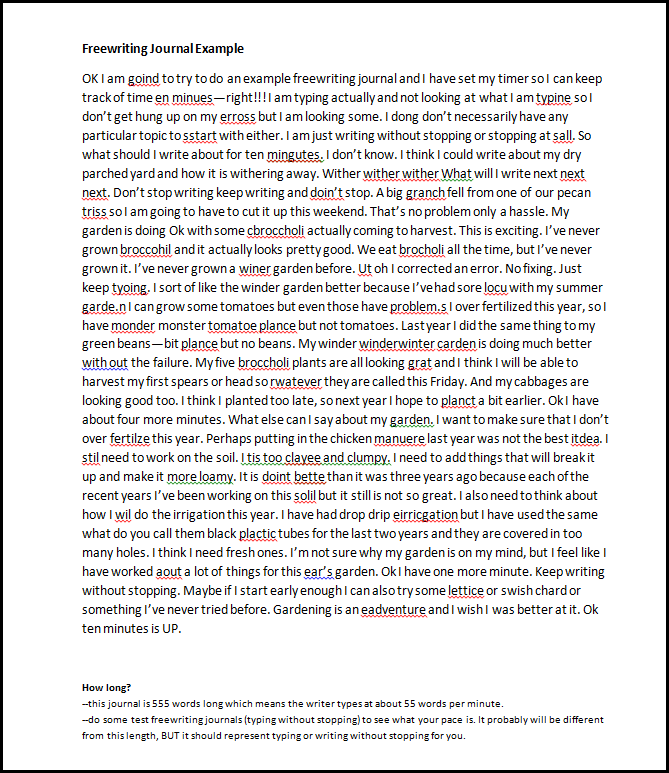 The Write Place: Guides for Writing and Grammar .............................Home
The Write Place: Guides for Writing and Grammar .............................Home Freewriting
Freewriting is one of the most powerful tools you can use to develop yourself as a writer. You will find freewriting useful as a way to develop your "writing muscle," and also as a technique you can use to generate ideas at any phase you are in while working on a piece of writing. Here are the "rules" for freewriting:
- Write for ten minutes
- Write continuously, without stopping
- Write without worrying about correctness (in spelling, content, form, topic, or anything)
- Write for only your eyes (don't think about audience as you write)
- Write on any topic you wish
Very simple. The key thing about freewriting is that you don't have to worry about "doing it right." For ten minutes at a time every day (or as many days a week you choose to practice freewriting), you will write "freely." The defining requirement of freewriting is that you write continuously, without pausing or stopping. This continuous "freewriting" is totally different from our normal mode of writing where we frequently pause and correct ourselves. Peter Elbow has been one of the chief proponents of freewriting, and he describes freewriting like this:
Don't stop for anything. Go quickly without rushing. Never stop to look back, to cross something out, to wonder how to spell something, to wonder what word or thought to use, or to think about what you are doing. If you can't think of a word or a spelling, just use a squiggle or else write, 'I can't think of it'…The easiest thing is just to put down whatever is in your mind. If you get stuck it's fine to write 'I can't think what to say, I can't think what to say' as many times as you want…the only requirement is that you never stop. (3)
Keep writing. Don't stop. When you reach those moments when you want to stop, when you feel an overwhelming compulsion to stop, when you have written ahead of your thoughts and you don't know where or what to write next--don't stop. Instead of looking up and stopping, keep writing through your "empty-headedness." Just keep writing your thoughts: "Well, I don't know what to say next, my hand hurts, when is this ten minutes going to be up, I sure hope I rolled up my windows because it's raining ..." Keep your pen or pencil moving. If you are really stuck, just write the word "the" over and over again. The the the the the the the the the the the the the the the ... . Eventually, you will come back to some sort of topic.
The object in this type of writing is not at first apparent. By writing in this way we are not listening at all (as much as that is possible) to our critical side. The idea is to get used to putting our thoughts down on paper unencumbered by any critical straightjackets. We don't have to worry about the constraints of form (writing an "essay") or reaching an audience (writing for a grade). Continued practice in this type of writing helps us get down what we mean more easily. As Peter Elbow goes on to say about freewriting, it helps to undo habits we may have to constantly correct ourselves which inhibits our ability to be creative and generative:
The main thing about freewriting is that it is nonediting. It is an exercise in bringing together the process of producing words and putting them down on the page. Practiced regularly, it undoes the ingrained habit of editing at the same time you are trying to produce. It will make writing less blocked because words will come more easily...
The habit of compulsive, premature editing doesn't just make writing hard. It also makes writing dead. Your voice is damped out by all the interruptions, changes, and hesitations between the consciousness and the page. In your natural way of producing words there is a sound, a texture, a rhythm--a voice--which is the main source of power in your writing. (6)
Also, you will find this kind of freewriting leads you to dialogue with yourself--to consider, evaluate, reflect upon what you think, feel, or experience. This "meta-discourse" is extremely valuable in the development of your thinking--which leads to the real hidden value of freewriting: it develops you thinking and "good thinking is the root of good writing." Although freewriting certainly can't be called "formal" writing that you might turn in for a grade to your teacher, you will certainly find freewriting helpful in developing your thinking and writing as you work on a more formal pieces of writing. However, simple freewriting has intrinsic value for writing development independent of formal writing assignments.
Lastly, let freewriting be messy. To truly let go in freewriting, you have to trust that it is OK for this writing to be full of grammatical errors and problems. Don't let yourself or anyone else judge this writing by the regular standards of writing we send to others to communicate. Also, trust that writing in this rough way will not infect you and make your propensity to make errors in writing grow. Freewriting has its own value and place and does not in any way negate or displace the importance of editing and clear, error-free writing.
Targeted Uses of Freewriting
Focused Freewriting
Focused freewriting maintains all the elements for regular freewriting, except you will try to maintain focus on a single topic or issue. Typically, freewriting may bounce around to multiple topics, but focused freewriting will zero in on one subject. Although focused freewriting can be used independent of a formal writing assignment, you may find it particularly helpful as an invention tool for these assignments. The beauty of freewriting is that you will find it helpful at any stage of your writing process--not just the beginning phase. For instance, you could use freewriting to focus on "what you really want to say" to help find your thesis. Later in your composing process, you might do a focused freewrite on one body paragraph that is giving you particular problems developing.Freewriting 1st Draft
Both Peter Elbow and John Trimble advocate writing what they call a "throw away" or "zero draft" of your essay. Trimble recommends that once you have reached the place where you feel you are ready to write (after what he calls the "data gathering phase") that you should take 30 minutes to freewrite a draft of your essay. Elbow points out that we should not make the threshold of readiness to write into a barrier, and he believes we can jump into a freewriting draft even when we don't have our paper all figured out. He is even an advocate for multiple, dashed-off freewriting drafts.However you write your freewriting draft, it is important to see this draft as a "throw away" draft, useful more for developing your thinking than actually writing the final product of your essay. After your complete your draft, review it for breakthroughs in your thinking, ideas for structure, or lines or phrasing that you might carry over into a subsequent, more carefully composed draft. (See also Approaching 1st Drafts).
See an example of freewriting. (Notice how messy it is! Keep writing; don't stop to fix errors--it's OK. Write for ten minutes.)

Elbow, Peter. Writing Without Teachers. 2nd ed. Oxford University Press, 1998.

Free Web Counter
(Since 1/12/16)

This work is licensed under a Creative Commons Attribution-NonCommercial 4.0 International License | Contact Lirvin | Lirvin Home Page | Write Place Home